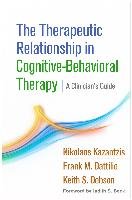From leading cognitive-behavioral therapy (CBT) experts, this book describes ways to tailor empirically supported relationship factors that can strengthen collaboration, empiricism, and Socratic dialogue and improve outcomes. In an accessible style, it provides practical clinical recommendations accompanied by rich case examples and self-reflection exercises. The book shows how to use a strong case conceptualization to decide when to target relationship issues, what specific strategies to use (for example, expressing empathy or requesting client feedback), and how to navigate the therapist's own emotional responses in session. Special topics include enhancing the therapeutic relationship with couples, families, groups, and children and adolescents. Reproducible worksheets can be downloaded and printed in a convenient 8 1/2" x 11" size.
See also Doing CBT, Second Edition, by David F. Tolin, which lucidly explains the full range of CBT techniques, and Experiencing CBT from the Inside Out, by James Bennett-Levy, Richard Thwaites, Beverly Haarhoff, and Helen Perry, a unique self-practice/self-reflection workbook.

